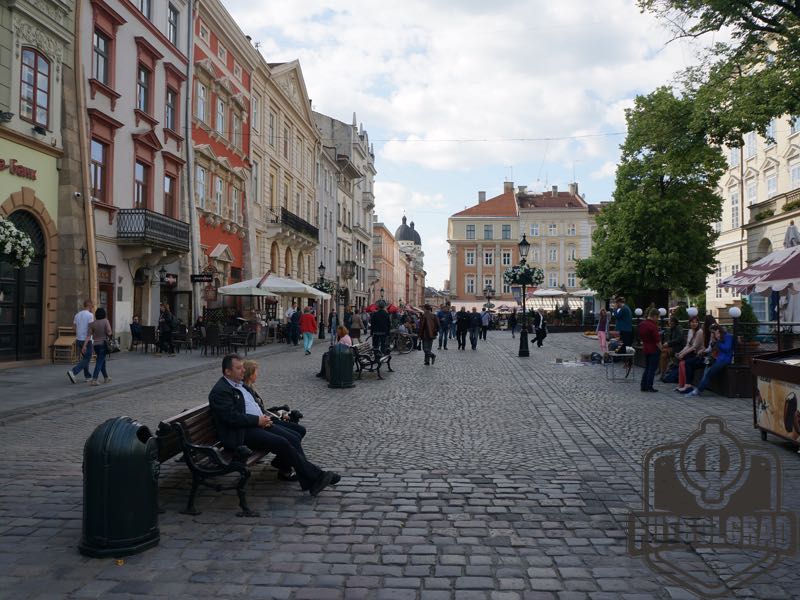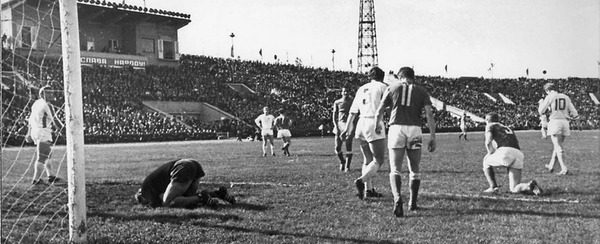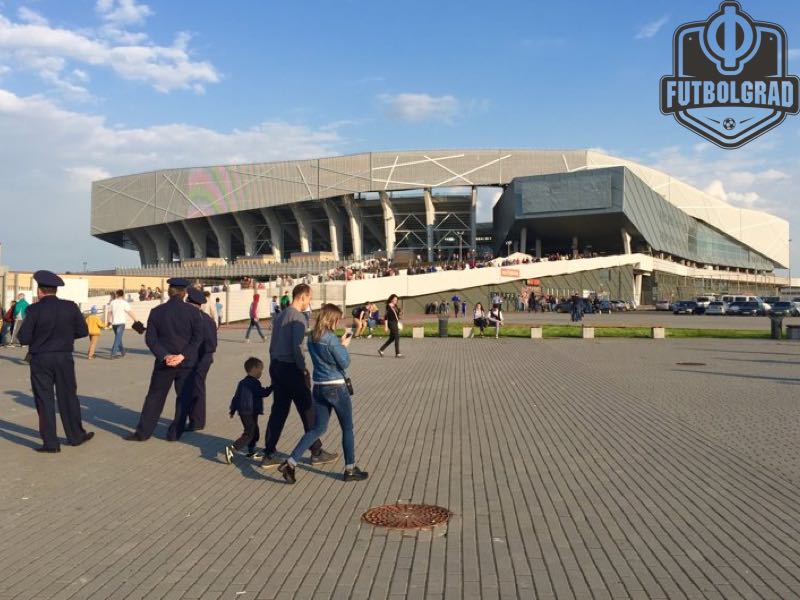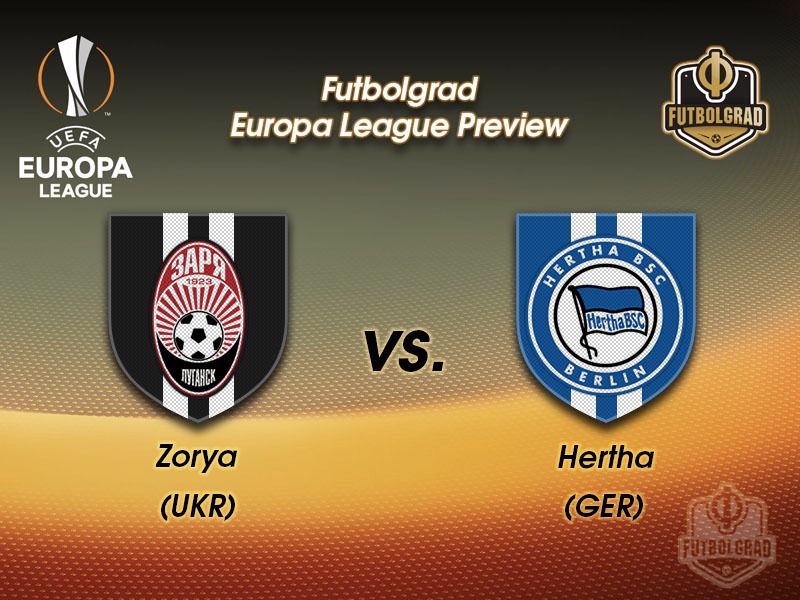Manuel Veth –
On Thursday Zorya vs Hertha will take place in the UEFA Europa League (read the full match preview right HERE). But as it has been the case now for three years for Zorya the club’s home Zorya vs Hertha will not take place at the Avanhard Stadium in Luhansk, but in the Arena Lviv in the very west of the country. In fact when Hertha visit Zorya on Thursday the distance from Berlin to Lviv will be shorter, 800km, then the distance from Luhansk to Lviv, 1200km.
The reason for Zorya’s exile is the on-going conflict in Eastern Ukraine. Today Luhansk is part of the proto-state Luhansk People’s Republic, which was formed together with the Donetsk People’s Republic and the Republic of Crime following the events of Euromaidan in the winter of 2013-14 and the overthrow of President Viktor Yanukovych. Following the ouster of President Yanukovych local anti-Maidan and pro-Russian protests intensified culminating in the proclamation of the People’s Republic of Luhansk and open warfare between Ukrainian armed forces and troops supported by Russia.
Together with Donetsk, the pro-Russian separatists tried to re-create the former state of Novorossiya, a territory held by the Russian Empire since the 18th century and turned over to the Ukrainian People’s Republic after 1917, the Russian separatists hoped to form a new state that would eventually be re-integrated into the Russian Federation. Ukraine has labelled both the two independent people’s republics and the Novorossiya as terrorist organisations that operate outside Ukrainian law.
The two People’s Republics, although illegitimate have operated like independent states and while Donetsk—the city’s club Shakhtar plays in Kharkiv—is still very much in the frontline of fighting even today Luhansk, which is located close to the Russian border has been experiencing relative peace—although car bombings and the assassination of LNR defence minister Oleg Anahchenko in February shows that the peace is uneasy at best. Hence, three years after the war in the Donbass has erupted Ukraine and the two People’s Republics are still in open arms with each other.
Zorya vs Hertha – A Game in the Shadow of Politics
For football clubs of the regions, such as Zorya and Shakhtar, the conflict has also meant adjustments. Zorya now plays their league games in the Slavutych Arena in Zaporizhia located just west of the Donbass on the Dnieper River. Opened in 2006 the stadium, however, is not approved by UEFA to hold either UEFA or Champions League matches, which means that Zorya has to play their European home matches even further afield.
Last season Zorya used the Chornomorets Stadium in Odesa. This season Zorya have decided to play their home games in the Arena Lviv, which was built to host the 2012 European Championships in 2012. Located in the very west of the country Lviv is the heartland of Ukrainian nationalism. Nowhere else in the country, other than in the Donbass of course, is the war more apparent than in Lviv.

Zorya vs Hertha will take place in Lviv (Manuel Veth/Futbolgrad Network)
Arriving in Lviv one will right away notice the many young men in army uniforms. It is not uncommon here for restaurants to charge a surcharge of 1% to pay for the war against the separatists and a local beer company sells a beer that labels Angela Merkel and Vladimir Putin as the reincarnation of Hitler and Stalin. Three years ago when Shakhtar started playing here, the club quickly realised that Lviv is an uneasy home outside the glorious European Champions League nights with many Western Ukrainians showing uneasiness towards a team from the Donbass.
Given that Hertha will likely bring a substantial crowd themselves the atmosphere should be relatively good on Thursday. More interesting will be the political expressions made by the partisan Lviv crowd with a team from the German capital travelling to the city.
Ukrainian politics and history aside Zorya have an exciting story on the pitch as well. Although Zorya had a sluggish start to the season with just three wins in the first 12 games, culminating in a seventh place in the league, the club is currently experiencing its best period since the 1970s.
Zorya vs Hertha Recalls the Most Successful Time of the Club in Exile
Founded in 1923 as Metalist Luganske the club underwent various name changes before finally settling for FC Zarya in the 1960 (the Russian spelling of Zorya). Meanwhile, the city of Luhansk, or Lugansk in Russian, was known as Voroshilovgrad from 1970 and 1990 and it was under the name of Zarya Voroshilovgrad that the club won their only national championship.
Promoted to the Soviet Vysshaya Liga in 1969 the club finished their second season in the Soviet top flight in fourth space. Already a significant achievement in itself the club topped the 1971 season by winning the league ahead of Dynamo Kyiv and Dinamo Tbilisi. What followed was the club’s only participation in the European Cup where Zorya eliminated APOEL in the first round before falling to Spartak Trnava in the second round.

Zorya won the Soviet championship in 1972 – Image via wikimedia.org
It would be the club’s only participation in a UEFA tournament until head coach Yuriy Vernydub over took over as the head coach in 2011. Under Vernydub Zorya was rebuild slowly but surely relying on local Ukrainian players, but also their close link with Shakhtar Donetsk, which allowed the club to bring in talented youth players from Ukraine’s richest club on loan.
Under Vernydub’s guidance, Zorya Luhansk steadily improved finishing 13th in his first full season avoiding relegation. What followed was a tenth, seventh spot in the 2013-14 season, which qualified them for the Europa League where eliminated by Feyenoord at the play-off stage. A fourth spot the following season qualified them for the Europa League playoffs once again, and this time it was Legia, who had the better of the Ukrainian side.
Three times is a charm, however, and in 2015-16 reached the final of the Ukrainian Cup, which qualified them directly for the Europa League group stage. Playing in Odesa, they were drawn in a group with Fenerbahçe, Manchester United and Feyenoord. With just two draws and four defeats, Zorya finished the group last, but another terrific run in the Ukrainian Premier League saw Zorya finish third and therefore straight qualification to the UEFA Europa League group stage once again.
Zorya vs Hertha Comes of the Back of Luhansk’s Biggest Success
Now playing in Europa League for a second straight season Zorya have finally collected their first win on matchday 2 by beating Athletic Bilbao away from home 2-0. It was a significant result for the Ukrainian club, who now want to build on recent successes by taking three points against Hertha.

Zorya vs Hertha Berlin will take place at the Arena Lviv. (Manuel Veth/Futbolgrad Network)
It is perhaps the big tragedy of Zorya’s story that the club is experiencing its most successful spell in the history of the club while being exiled from their home stadium. Furthermore, the political situation in the country means that it is unlikely that Zorya will return home anytime soon. Even if the situation in Luhansk should stabilise a return would be impossible as long as the People’s Republic of Luhansk is in existence.
Owned by the oligarch Yevhen Heller, a close friend of Shakhtar’s owner Rinat Akhmetov, the club’s return anytime before a real resolution could be signed would be a legitimisation by the club and the owner of the People’s Republic. Here the club follows the political line set by Rinat Akhmetov and Shakhtar, who have been clear that there cannot be football in the Donbass in the current political climate. All of this means that the citizens of Luhansk can only follow this successful period from a distance and given how similar conflicts in the region, such as South Ossetia and Abkhazia, have played out Zorya, alongside Shakhtar, may never return home. Zorya vs Hertha might also bring back attention to a conflict that is still taking place in the heart of Europe at this very moment. With a big German club travelling to Ukraine the conflict will most certainly, at leat for a short time, be a topic of discussion once again.
Manuel Veth is the owner and Editor in Chief of the Futbolgrad Network. He also works as a freelance journalist and social media editor at Bundesliga.com. He holds a Doctorate of Philosophy in History from King’s College London, and his thesis is titled: “Selling the People’s Game: Football’s transition from Communism to Capitalism in the Soviet Union and its Successor States,” which will be available in print soon. Originally from Munich, Manuel has lived in Amsterdam, Kyiv, Moscow, Tbilisi, London, and currently is located in Victoria BC, Canada. Follow Manuel on Twitter @ManuelVeth.





















COMMENTS